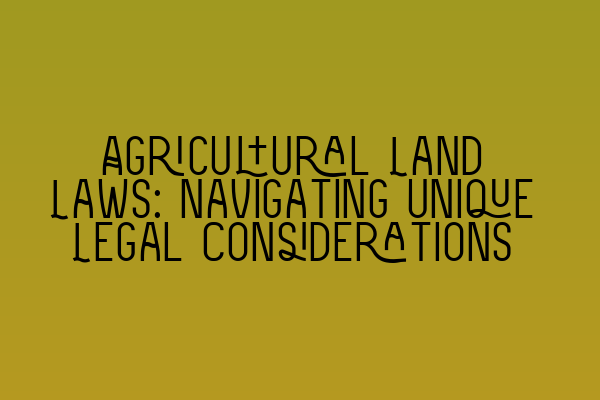Agricultural Land Laws: Navigating Unique Legal Considerations
Welcome to SQE Property Law & Land Law! As solicitors specializing in property law, we understand the importance of staying up-to-date with the latest legal considerations and regulations. Today, we are diving into the world of agricultural land laws and exploring the unique challenges and considerations that arise when dealing with this specialized area of law.
Understanding Agricultural Land Laws
Agricultural land laws govern the ownership, use, and transfer of land used for agricultural purposes. This includes farmland, pastureland, and land used for the rearing of livestock. Given the unique nature of agricultural land, it is essential to have a clear understanding of the legal framework surrounding its ownership and use.
Key Legal Considerations
1. Planning Permission: Before undertaking any significant developments or changes on agricultural land, it is crucial to determine whether planning permission is required. Failure to obtain appropriate planning permission can result in legal consequences. Understanding the planning process and any limitations specific to agricultural land is essential.
2. Agricultural Tenancies: Agricultural tenancies are an integral aspect of agricultural land laws. These agreements dictate the rights and responsibilities of both landowners and tenants. Familiarizing yourself with the types of agricultural tenancies and their legal implications will help you navigate this complex area.
3. Subsidies and Grants: Many agricultural businesses rely on financial support through subsidies and grants. It is vital to understand the eligibility criteria, application process, and ongoing obligations associated with these agricultural subsidies and grants to fully advise clients.
4. Environmental Regulations: Agricultural land is subject to various environmental regulations, including those relating to pollution, water management, and habitat preservation. Ensuring compliance with these regulations is crucial to avoid legal disputes and environmental harm.
Land Use and Development
Land use and development on agricultural land can be complex due to environmental and planning considerations. It is crucial to assess potential environmental impacts and consult with relevant environmental authorities to ensure compliance with regulations. Additionally, understanding the permitted uses and restrictions on agricultural land will help determine the feasibility of development plans.
In some cases, change of use applications may be required to transition agricultural land to a different use. These applications involve detailed assessments of the ecological, social, and economic impacts of the proposed change. Engaging with experienced solicitors can facilitate the process and increase the likelihood of a successful application.
Conclusion
Navigating agricultural land laws requires a deep understanding of the unique legal considerations and challenges involved. From planning permission to agricultural tenancies and environmental regulations, the intricacies of this specialized area cannot be overlooked. At SQE Property Law & Land Law, we are equipped with the expertise and knowledge to guide you through the complexities of agricultural land laws.
If you’d like to explore more topics related to property law and land law, check out our related articles:
- SQE 1 Practice Exam Questions
- SQE 1 Practice Mocks FLK1 FLK2
- SQE 2 Preparation Courses
- SQE 1 Preparation Courses
- SRA SQE Exam Dates
Thank you for reading our blog post. We hope you found it informative and valuable. If you have any further questions or require legal assistance with agricultural land matters, please don’t hesitate to contact us. Our team of dedicated solicitors is here to help.
